
Nature Climate Change
Scope & Guideline
Advancing the Dialogue on Climate Solutions
Introduction
Aims and Scopes
- Climate Science and Impacts:
Research focusing on the physical science of climate change, including observational studies and modeling efforts to understand global warming, climate variability, and extreme weather events. - Mitigation Strategies:
Exploration of various strategies for reducing greenhouse gas emissions, including technological advancements in carbon capture and storage, renewable energy adoption, and policy frameworks. - Adaptation and Resilience:
Studies on how societies and ecosystems can adapt to the changing climate, emphasizing resilience-building, risk management, and sustainable practices. - Socio-Economic Dimensions:
Examination of the social, economic, and political factors that influence climate action, including equity considerations, public engagement, and policy effectiveness. - Biodiversity and Ecosystem Services:
Research on the effects of climate change on biodiversity, ecosystem health, and the services these ecosystems provide, highlighting the importance of conservation and sustainable management.
Trending and Emerging
- Interdisciplinary Approaches to Climate Solutions:
Recent publications increasingly emphasize integrated approaches that combine climate science with social sciences, economics, and policy studies to develop holistic climate solutions. - Technological Innovations for Climate Mitigation:
A growing focus on innovative technologies, such as carbon capture and storage, renewable energy technologies, and geoengineering, reflects an urgent need for effective mitigation strategies. - Climate Justice and Equity:
There is an emerging emphasis on climate justice, highlighting the need to address inequities in climate impacts and responses, and to incorporate diverse perspectives in climate policy discussions. - Health Impacts of Climate Change:
Research exploring the linkages between climate change and public health has gained momentum, focusing on how climate impacts exacerbate health risks and the importance of health-centric climate policies. - Biodiversity and Ecosystem Restoration:
An increasing number of studies are dedicated to understanding the interplay between climate change and biodiversity, with a focus on restoration efforts and the role of ecosystems in climate mitigation.
Declining or Waning
- Focus on Fossil Fuel Dependency:
There has been a reduction in papers directly addressing fossil fuel dependency and its implications, possibly due to a shift towards more innovative and sustainable energy solutions. - Traditional Climate Modeling Approaches:
The emphasis on conventional climate modeling techniques appears to be waning, as newer methodologies such as machine learning and big data analytics are gaining prominence. - Historical Climate Events Analysis:
Research centered around retrospective analyses of historical climate events is less prevalent, reflecting a shift towards predictive modeling and future climate scenarios. - Regional Climate Impacts:
While still relevant, there is less emphasis on localized studies of climate impacts compared to broader global assessments, indicating a potential shift towards integrative global models.
Similar Journals
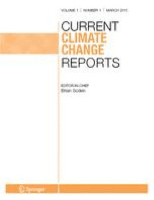
Current Climate Change Reports
Transforming Climate Research into ActionCurrent Climate Change Reports, published by SPRINGER HEIDELBERG, stands at the forefront of research in the realms of atmospheric science and global change, boasting an impressive Q1 category ranking in both fields as of 2023. With an ISSN of 2198-6061, this esteemed journal has been disseminating crucial findings since its inception in 2015 and continues to be a pivotal platform for scholarly discourse on climate issues. Based in Switzerland, the journal offers a comprehensive examination of climate dynamics, impacts, and sustainability solutions, thereby addressing the pressing challenges associated with climate change. While currently not available as open access, Current Climate Change Reports is indexed in Scopus, where it ranks in the top tiers, notably #2 in Atmospheric Science and #4 in Environmental Science, reflecting its significant influence and contribution to scientific knowledge. Researchers, professionals, and students alike will find this journal an indispensable resource for the latest developments and insights in climate research.

Nature Sustainability
Empowering change for a sustainable future.Nature Sustainability, published by NATURE PORTFOLIO, is a leading international journal that champions cutting-edge research in sustainability across a multitude of disciplines. Since its inception in 2018, the journal has made significant strides in publishing high-impact articles that address the pressing challenges of our time, from ecology and food science to urban studies and renewable energy. With an impressive impact factor and consistent Q1 quartile rankings in various categories such as Global and Planetary Change and Management, Monitoring, Policy and Law, it stands at the forefront of research dissemination in sustainability. Although access options remain undefined, the journal reaches a wide audience determined to drive impactful change through innovative research within the realm of environmental and social sciences. Nature Sustainability not only illuminates pathways toward sustainable practices but also fosters interdisciplinary collaboration, making it an essential resource for researchers, professionals, and students committed to advancing sustainability initiatives globally.
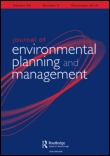
Journal of Environmental Planning and Management
Fostering interdisciplinary dialogue for a sustainable future.The Journal of Environmental Planning and Management, published by Routledge Journals, Taylor & Francis Ltd, is a leading academic journal dedicated to advancing the field of environmental science through innovative research and critical analysis. With a robust impact factor and categorized in Q1 across multiple disciplines, including Environmental Science, Geography, and Fluid Flow, this journal holds a prestigious position in the academic community. It serves as a vital platform for researchers, professionals, and students interested in the complexities of environmental management, policy, and planning, promoting insightful discourse on sustainable practices and innovative solutions. Although the journal does not currently offer Open Access options, it remains widely accessible through institutional subscriptions, ensuring that pertinent research reaches a broad audience. Since its inception in 1992, the journal has shown a commitment to excellence, making significant contributions to our understanding of environmental issues and the interplay between human activity and natural systems. The Journal of Environmental Planning and Management invites submissions that not only push the boundaries of existing knowledge but also foster interdisciplinary collaboration in the quest for sustainable development.

Atmosphere
Innovating Research for a Sustainable FutureAtmosphere is a premier open-access journal dedicated to the field of atmospheric sciences, published by MDPI since 2010. With an E-ISSN of 2073-4433, the journal has established itself as a significant platform for the dissemination of research on atmospheric processes, climate change, and environmental dynamics. Based in Switzerland, the journal has garnered impressive recognition within the academic community, currently ranked in the 3rd quartile for Atmospheric Science and the 2nd quartile for Environmental Science (miscellaneous) as of 2023. Notably, it holds a commendable Scopus rank, emphasizing its impact with a 69th percentile standing in its category. Atmosphere aims to foster innovative research and comprehensive reviews that contribute to the understanding of air quality, climate policy, and environmental sustainability. Its open-access model not only supports the global sharing of knowledge but also enhances visibility and engagement among researchers, professionals, and students alike, making it an essential resource for anyone invested in the study of our planet's atmosphere.

Environmental Policy and Governance
Shaping Tomorrow's Policies for a Sustainable FutureEnvironmental Policy and Governance is a premier academic journal published by WILEY PERIODICALS, INC, based in the United Kingdom, dedicated to advancing the understanding and implementation of environmental policy across various governance frameworks. With an ISSN of 1756-932X and E-ISSN 1756-9338, this journal spans from 2009 to 2024, reflecting a rich history of contributions to the field. Renowned for its rigorous scholarship, it holds a prestigious Q1 ranking in both Geography, Planning and Development and Management, Monitoring, Policy and Law, positioning it in the top tier of academic discourse. The journal has made significant strides in promoting interdisciplinary research, fostering dialogue among policymakers, scholars, and practitioners, and addressing pressing global environmental challenges. Although currently not an Open Access publication, its high impact factor underlines its relevance and authority, making it an essential resource for researchers, professionals, and students eager to explore innovative solutions and best practices in environmental governance.

Earth Systems and Environment
Innovating Solutions for Earth’s Environmental ChallengesEarth Systems and Environment, published by Springer International Publishing AG, is a leading peer-reviewed journal dedicated to the multidisciplinary study of natural and anthropogenic processes that shape the Earth's systems. With an impressive impact factor and consistently ranked in the Q1 category across various fields, including Computers in Earth Sciences, Economic Geology, and Environmental Science, it stands as a premier platform for researchers and professionals seeking to address pressing environmental challenges. The journal covers a wide spectrum of topics, from geology to global change, and emphasizes innovative methodologies and interdisciplinary approaches to understand and manage Earth systems. As an essential resource for scholars and practitioners, Earth Systems and Environment commits to excellence and facilitates open dialogue on critical issues affecting our planet.
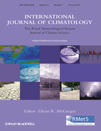
INTERNATIONAL JOURNAL OF CLIMATOLOGY
Illuminating the path to informed climate policy.INTERNATIONAL JOURNAL OF CLIMATOLOGY, published by WILEY, is a leading peer-reviewed journal dedicated to advancing our understanding of climate science. As a prominent periodical within the Q2 category of Atmospheric Science, it encompasses a wide range of topics related to climatology, including climate variability, modeling, and impacts of climate change, making it an essential resource for researchers, professionals, and students in the field. With a history of publication spanning from 1989 to 2024, the journal has established a strong reputation for disseminating high-quality research that informs policy and practice. Though it does not offer Open Access options, its articles are accessible to a broad audience through institutional subscriptions, ensuring that significant findings can reach those who need them most. The INTERNATIONAL JOURNAL OF CLIMATOLOGY plays a crucial role in connecting academia with pressing environmental issues, thus fostering dialogue and innovation in climate research.
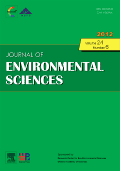
Journal of Environmental Sciences
Pioneering Research in Environmental Science and EngineeringJournal of Environmental Sciences, published by SCIENCE PRESS, is a premier scholarly journal dedicated to advancing knowledge in the multidisciplinary fields of environmental science, environmental chemistry, and environmental engineering. Established in 1970 and based in Beijing, China, this journal has consistently garnered recognition for its high-quality research, demonstrated by its Q1 rankings across multiple categories, including Environmental Chemistry, Environmental Engineering, and General Environmental Science. With an impressive Scopus rank of #11 for Environmental Science, the journal has firmly positioned itself within the top tier of its field, attracting contributions from leading researchers and academics worldwide. Although it operates under subscription access, the journal's commitment to disseminating critical insights into pressing environmental issues makes it an invaluable resource for professionals, researchers, and students striving to make impactful contributions to the understanding and management of environmental challenges.
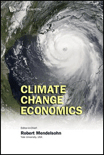
Climate Change Economics
Transforming Insights into Actionable StrategiesClimate Change Economics, published by World Scientific Publishing Co Pte Ltd, is a leading interdisciplinary journal dedicated to advancing research on the economic aspects of climate change. With an impressive impact factor reflected in its Q2 ranking in both the Economics and Econometrics and Global and Planetary Change categories, as well as a Q1 status in Management, Monitoring, Policy and Law, this journal serves as a vital platform for researchers, policymakers, and practitioners alike. The journal encompasses a wide range of topics, from economic modelling of climate impact to innovative policy responses and sustainable management practices, providing critical insights essential for effective decision-making. Operating from Singapore, Climate Change Economics emphasizes open dialogue and evidence-based solutions to confront one of the most pressing challenges of our time, fostering a cross-disciplinary approach to climate-related economic research. Researchers, professionals, and students are encouraged to explore the diverse array of articles that contribute to the evolving discourse on sustainable economics.
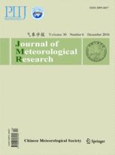
Journal of Meteorological Research
Advancing the Frontiers of Atmospheric Science.The Journal of Meteorological Research, published by SPRINGER HEIDELBERG, stands as a vital resource in the fields of Atmospheric Science and Ocean Engineering, boasting an impressive impact factor that reflects its scholarly significance. With its ISSN 2095-6037 and E-ISSN 2198-0934, the journal offers an open access platform, fostering accessibility and dissemination of cutting-edge research. Established in 2014 and running through to 2024, it is particularly distinguished in 2023 as Q2 in Atmospheric Science and Q1 in Ocean Engineering, underscoring its important contributions to these disciplines, with remarkable rankings in Scopus that place it in the top tiers of both categories. The journal accepts a broad range of research articles, reviews, and innovative methodologies, catering to a diverse audience of researchers, professionals, and students eager to advance their knowledge and expertise in meteorological studies. This makes the Journal of Meteorological Research an essential platform for anyone engaged in understanding and addressing the complex challenges of our changing climate.